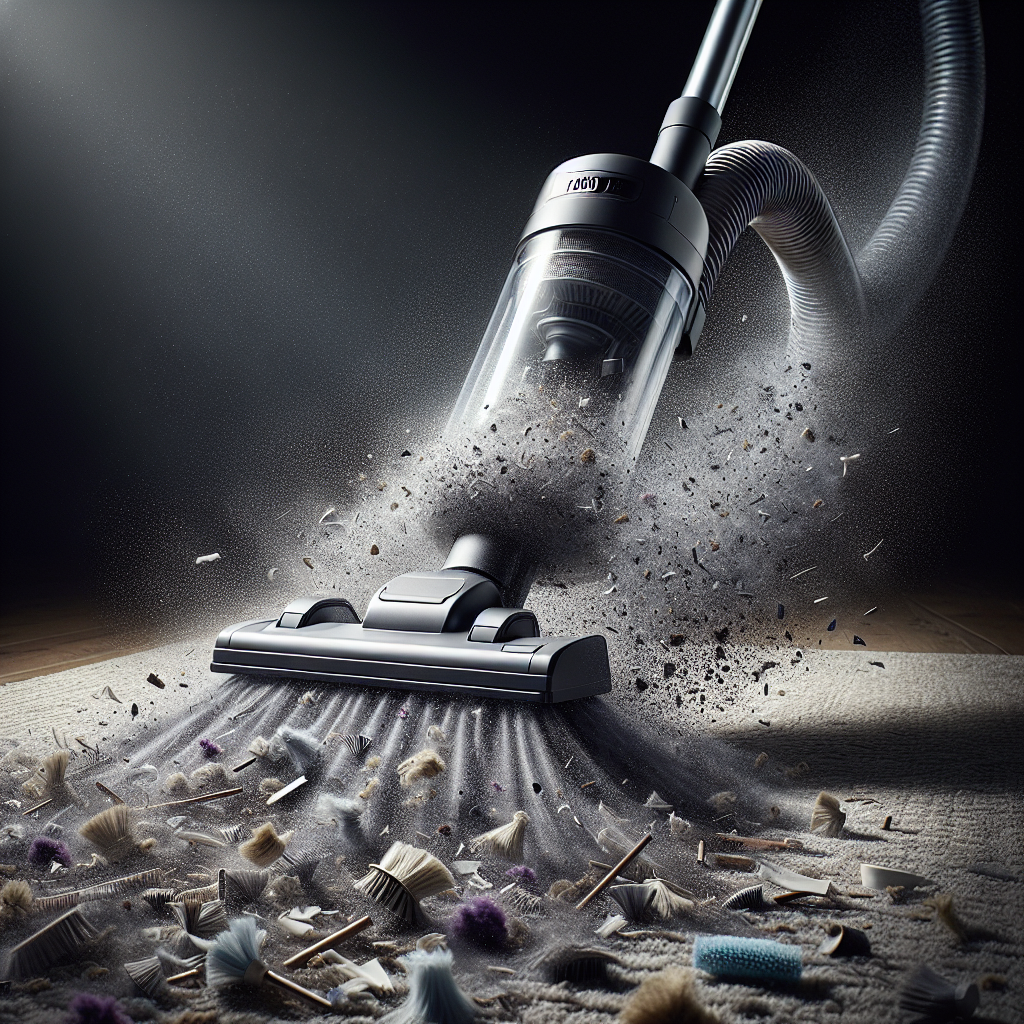Have you ever wondered if a vacuum cleaner with 12000 pa suction is considered good? With its powerful suction capabilities, a vacuum cleaner boasting 12000 pa suction is often praised for its ability to effectively pick up dirt and debris from various surfaces. Whether it’s crumbs on the kitchen floor or pet hair on the carpet, this level of suction power ensures a thorough clean, leaving your home looking pristine. So, if you’re in search of a vacuum cleaner that can tackle even the toughest messes, 12000 pa suction is definitely worth considering. Say goodbye to pesky dirt and hello to a cleaner living space with the power of 12000 pa suction!
What is 12000 Pa Suction?
12000 Pa suction refers to the suction power of a vacuum cleaner, measured in units called Pascal (Pa). It indicates the strength of suction, which determines the cleaner’s ability to pick up dirt, dust, and debris from various surfaces. A vacuum with 12000 Pa suction is considered to have strong suction power, making it effective for a wide range of cleaning tasks.
Definition of Pa
Pa, short for Pascal, is a unit of pressure named after the French mathematician and physicist Blaise Pascal. It is a widely used metric measurement for pressure and suction power. In the context of vacuum cleaners, Pa represents the amount of air pressure the device can create to lift dirt and debris from surfaces.
What is Suction Power?
Suction power refers to the strength of a vacuum’s airflow, which determines how well it can extract dirt and debris from surfaces. It is the key factor that determines a vacuum cleaner’s performance. The higher the suction power, the more effectively it can clean various surfaces.
Understanding 12000 Pa Suction
With 12000 Pa suction power, a vacuum cleaner can generate a strong airflow to pick up dust, dirt, pet hair, and other small particles from carpets, rugs, hardwood floors, and upholstery. This level of suction is suitable for most common household cleaning tasks.
Factors Affecting Suction Power
Several factors can influence the suction power of a vacuum cleaner. Understanding these factors can help you make an informed decision about which vacuum cleaner to choose for your cleaning needs.
Motor Power
The motor power of a vacuum cleaner plays a significant role in determining its suction power. A more powerful motor can generate greater airflow, resulting in higher suction power. Vacuums with motors rated for higher wattage generally have stronger suction capabilities.
Design and Type of Vacuum
The design and type of vacuum cleaner can also affect its suction power. Some vacuum designs are specifically engineered to maximize airflow and suction efficiency, resulting in higher overall suction power. Different types of vacuums, such as upright, canister, or handheld, may also have varying suction capabilities.
Filtration System
The filtration system used in a vacuum cleaner can impact its suction power. A clogged or poorly designed filtration system can restrict airflow, reducing the vacuum’s suction capabilities. Look for vacuums with efficient filtration systems that can maintain strong suction power even as the filters collect dirt and debris.
Brushes and Attachments
The brushes and attachments included with a vacuum cleaner can impact its suction power on different surfaces. Certain brushes or attachments may be more effective at agitating carpets or reaching into tight corners, resulting in better suction overall. Choosing the right combination of brushes and attachments can optimize the vacuum’s performance.
Floor Type
Different floor types require different suction power for effective cleaning. Carpeted surfaces generally benefit from higher suction power to extract embedded dirt and debris. Hardwood or tiled floors may require less suction power to avoid damage. Consider the floor types in your home when selecting the appropriate suction power for your vacuum cleaner.
Is 12000 Pa Suction Good Enough?
Whether 12000 Pa suction is good enough for your cleaning needs depends on various factors. Let’s explore the different considerations that can help determine if this suction power is suitable for your requirements.
Average Household Cleaning Needs
For most average household cleaning tasks, 12000 Pa suction power is more than sufficient. It can effectively pick up dust, pet hair, crumbs, and other common debris from carpets, floors, and upholstery. If your cleaning needs primarily involve maintaining cleanliness in a typical home, this level of suction power should be adequate.
Optimal Suction Power Range
The optimal suction power range for daily home cleaning tasks is typically between 5000 Pa and 15000 Pa. 12000 Pa suction power falls within this range, indicating that it is well-suited for regular cleaning duties. It strikes a balance between effective cleaning performance and energy efficiency.
Specific Cleaning Requirements
If you have specific cleaning requirements, such as heavy pet shedding, thick-pile carpets, or persistent dust allergies, you may benefit from a vacuum with higher suction power. However, it’s important to note that excessively high suction power can also damage delicate surfaces or make the vacuum difficult to maneuver on certain floor types.
Advantages of 12000 Pa Suction
12000 Pa suction power offers several advantages for your cleaning needs:
Effective Removal of Dust and Debris
With strong suction power, a vacuum cleaner with 12000 Pa suction can effectively remove dust, dirt, pet hair, and other debris from various surfaces. It ensures thorough cleaning and allows you to maintain a clean and healthy living environment.
Suitability for Different Surfaces
12000 Pa suction power is versatile, making it suitable for cleaning a wide range of surfaces. Whether you have carpets, rugs, hardwood floors, or upholstery, a vacuum with this level of suction power can effectively clean all these surfaces without losing performance.
Time and Energy Efficiency
Due to its strong suction power, a vacuum with 12000 Pa suction can complete cleaning tasks efficiently. It picks up dirt and debris in fewer passes, saving you time and energy during your cleaning routine. The efficient performance ensures that you can clean quickly and still achieve satisfactory results.
Disadvantages of 12000 Pa Suction
While 12000 Pa suction power offers many advantages, it also has a few limitations to consider:
Potential for Damaging Delicate Surfaces
Vacuuming delicate surfaces, such as certain types of rugs, curtains, or antique furniture, with a vacuum cleaner set to high suction power can result in damage. The strong suction force can pull and stretch delicate fibers or cause items to become dislodged. It’s important to use caution and adjust the suction power when dealing with delicate surfaces.
Higher Noise Levels
Vacuum cleaners with higher suction power tend to produce more noise during operation compared to lower-powered models. If you are sensitive to loud noises or have noise restrictions in your living environment, you may need to consider the noise levels associated with a vacuum cleaner with 12000 Pa suction.
Limited Deep Cleaning Abilities
While 12000 Pa suction power is effective for most regular cleaning tasks, it may have limitations when it comes to deep cleaning tasks. Deeply embedded dirt or stains may require additional cleaning methods or specialized tools. The suction power alone may not be sufficient for deep cleaning heavily soiled carpets, for example.
Comparing 12000 Pa Suction to Other Suction Powers
Understanding how 12000 Pa suction power compares to other levels of suction power can help you gauge its effectiveness for your cleaning needs.
Lower Suction Powers
Vacuums with lower suction powers, such as 5000 Pa or less, may struggle to effectively clean certain surfaces or pick up stubborn debris. They are generally more suitable for light cleaning or quick touch-ups rather than deep cleaning tasks. However, they may offer quieter operation and be more energy-efficient.
Higher Suction Powers
If you require exceptionally strong suction power, vacuums with suction powers exceeding 12000 Pa may be more suitable. These higher-powered vacuums can handle heavy-duty cleaning tasks, deep clean carpets, or extract dirt from hard-to-reach areas. However, they may be bulkier, noisier, and consume more energy.
Choosing the Right Suction Power for Your Needs
When selecting a vacuum cleaner, it is essential to consider your specific cleaning requirements and other factors to choose the right suction power.
Considerations for Average Household
For most average households, a vacuum cleaner with 12000 Pa suction power will meet the general cleaning needs. It offers a balance between effective cleaning performance and energy efficiency. Consider the mix of floor types, the presence of pets, and any specific cleaning challenges you frequently encounter.
Special Cleaning Requirements
If you have special cleaning requirements, such as homes with multiple pets, high-pile carpets, or specific allergies, you may need a vacuum cleaner with higher suction power. Identify your unique cleaning needs and choose a vacuum that provides the necessary suction power and specialized features, such as specific attachments or filtration systems.
Budget and Available Options
Consider your budget and the available vacuum cleaner options within your price range. Remember that suction power is just one factor to consider when choosing a vacuum cleaner. Evaluate other features, such as maneuverability, ease of use, and durability, to make an informed decision based on your specific requirements.
Maintaining and Optimizing Suction Power
To ensure consistent suction power and optimal cleaning performance, it is important to properly maintain and optimize your vacuum cleaner.
Regular Cleaning and Maintenance
Regularly clean and maintain your vacuum cleaner according to the manufacturer’s recommendations. This includes emptying the dust container or replacing the bag, cleaning or replacing filters, and checking for any clogs that may inhibit airflow. Proper maintenance will help maintain the vacuum’s suction power over time.
Proper Usage and Handling
Follow proper usage and handling guidelines provided by the manufacturer. Avoid overloading the vacuum with debris, as this can decrease suction power and strain the motor. Use the appropriate attachments for different surfaces and avoid excessive force or rough handling that may damage the vacuum or reduce its suction capabilities.
Replacing Filters and Brushes
Filters and brushes play a crucial role in maintaining suction power. Over time, filters can become clogged with dirt and debris, reducing airflow and suction. Regularly clean or replace filters as recommended by the manufacturer. Similarly, replace brushes as needed to maintain optimal cleaning performance.
Regular Emptying of Dust Container
Empty the dust container or replace the bag frequently to prevent it from becoming overly full. A full container can obstruct airflow and reduce suction power. Regularly emptying the dust container or replacing the bag ensures consistent suction power and efficient cleaning.
Conclusion
12000 Pa suction power is a great choice for most average households. It offers strong suction capabilities, effectively removing dust and debris from various surfaces. While there may be limitations with delicate surfaces and deep cleaning tasks, 12000 Pa suction strikes a balance between cleaning performance and energy efficiency. Consider your specific cleaning requirements and factors like floor type, motor power, and budget when choosing a vacuum cleaner with the right suction power for your needs. Proper maintenance and optimization of suction power will further enhance your cleaning experience.

